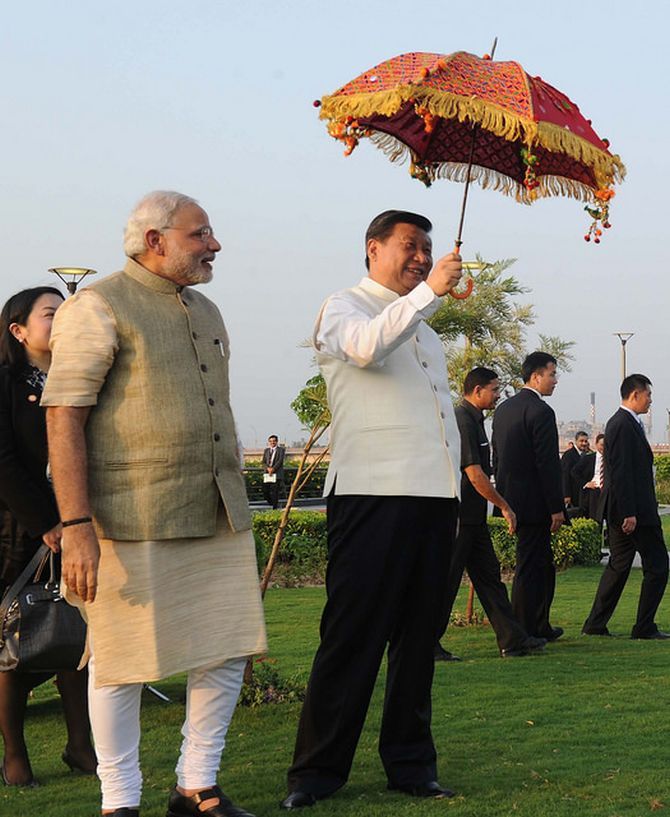'Today the Chinese think they can slap India, and there will be no consequences.'
'China must be made to feel the consequences through any and all means,' says Rajeev Srinivasan.

It has all the makings of a pantomime story or even a Bollywood potboiler: The hero reaches out a hand in friendship, the villain slaps it away.
Instead of learning from this mistake, the hero, once again, reaches out and tries to make peace, but no, the villain doesn't want it. Then, finally, after all other options are exhausted, the hero is forced to take a stand and fight for his rights.
That's roughly how things are between India and China. Time after time, India attempts to make friends with China, but each time there is bitter disappointment. But yet, the next time, not having learned from every previous experience, India tries again.
Didn't we learn anything from Tibet, 1959, the India-China War, 1962, the screwdriver-job Pakistani nuclear bomb, 1989, the interminable and infructuous border talks, 1962 till today, and now, NSG, 2016? Or even from the experience of the Pandavas in the Mahabharata, thwarted at every turn by Kaurava hostility and recalcitrance?
I couldn't believe it when the foreign ministry spokesman tweeted on July 2 how India would not retaliate against China by blackballing it in MTCR (the Missile Technology Control Regime) just like China, alone, just thwarted India's entry into the NSG (Nuclear Suppliers Group).
Why do we make these entirely unnecessary, unilateral concessions? This is like the grand statement that India will abjure the first use of nuclear weapons. Yes, it's good moralising, but that gets us nothing. Better to be coy.>
The fact of the matter is that 'bhai-bhai' talk notwithstanding, China is our bitterest enemy today and for the foreseeable future. Poor George Fernandes got crucified for stating this self-evident fact, but, as Galileo Galilei said in a different context, it is still true.
For millennia, there was no conflict between the two, some will say, and that is also true. But that was only because there was the giant buffer state of Tibet between us, and the moment it was swallowed up by China, all bets were off.
Today China is an insecure, increasingly wealthy, but totalitarian State (I hate to use the Nazi analogy because it causes people to roll their eyes, but it is still true): It is a continent-sized version of pre-WW2 Germany. The only difference is that Germany faced some large and hostile powers in its neighbourhood that constrained it, but China has none except feeble and dithering India.
For millennia, the Indian subcontinent and China were the superpowers of the world economy, accounting for roughly equal quarters of world output, as in Angus Maddison's magisterial account of world economy. Today, that historic India has shrunk with the loss of Pakistan, Bangladesh (and you could count Afghanistan too as part of the historic cultural area).
Whereas, if I am not mistaken, the Chinese empire is at its largest in all of history, with the annexation of Tibet and Sinking, and now the bold grab for the entire South China Sea.
That itself is an indication of trends: India's cultural and economic space is shrinking in Asia, and China's is expanding. Oddly enough, India had a far greater cultural hinterland in Greater India: The entire landmass of Southeast Asia was an Indian cultural colony, and much of Central Asia, too.
China, despite its glittering empires, was never able to influence others greatly except through wholesale transfer of its excess population to its neighbours.
Indians hardly ever emigrated except if you count the Out of India theory, but I digress; Chinese emigrated in giant waves. There is a simple reason for this, too: India has good land. 56% of it is arable if there is irrigation, whereas only 14% of China + Tibet is. Chinese sought lebensraum. And they still do.
China's civilisational hallmarks have been two things: Centralised empires, and innovation in very practical ways: Inventing gunpowder, the magnetic compass, and paper. Today, it is on the way to becoming another empire, and the way it is investing in world-class universities, it may well become an innovator as well.
That is the positive forecast. Xi Jinping, the current strongman, believes he will get the country there and make it the #1 economic, military and cultural power.
The negative forecast, if you believe people ranging from Andy Xie to Gordon Chang, is that a huge debt overhang will bring the Chinese project to an abrupt end in a 1929-like Great Depression. The Chinese empire may well be more brittle than we think.
India has to be prepared for both scenarios. But I will just consider the first here. It is nothing short of astonishing how far they have come economically in just 30-odd years, rocketing from nowhere to the world's second-largest economy, and from a lower per-capita GDP than India to roughly three times.
More ominously, it has gone from an ill-fed army in 1959 to a major blue-water navy with a nuclear triad in place, and a bevy of client States and naval facilities all around. And make no mistake, the One Belt One Road plan is for military as well as trade reasons.
How does India compete with this implacable enemy, which seems to hold all the cards?
It has $3 trillion in assets, it is rapidly modernising its navy (especially its submarines) and tiptoeing into the Indian Ocean, it has created a 'string of pearls' to contain India. Its proxy Pakistan is a force multiplier to keep Indian pinned down in that absurd idea, 'South Asia'.
Well, the first thing to do is to realise that there will never be any possibility of friendship and fellowship with China. This continent is simply not big enough for the two countries. All that naive 'solidarity of the Third World' garbage is finally getting buried, even though Nehruvian Stalinists still mouth it.
China wants to destroy us, keep us down, preferably use as a colony of coolies, and it has its fifth columnists in place all over the country.
Then there has to be a strategy. Here are two simple suggestions, which even the grossly under-achieving mandarins of the foreign service should be able to understand. The first comes from Game Theory. Interactions between powers can be modelled as a repeated Prisoner's Dilemma game. It turns out the best, the very best, strategy is a simple 'tit-for-tat.'
By all means, extend the hand of friendship and cooperate, but it you are betrayed, then betray back the next time you have a chance. And please, for heaven's sake, don't talk about it: Just maintain an inscrutable silence.
The second suggestion goes back to Chanakya. We have tried samam, unending palavers and goodwill missions, and even the PM's charm offensive. We have tried danam: Nehru gave away the UN Security Council seat to them; he gifted the Cocos Islands to Burma, which gifted the same to China. And so on and so on.
So now it's time to try bhedam and a little dandam.
China is ripe for bhedam. There is insurgency in Tibet, there is Islamic insurgency in Sinkiang. As for dandam, in containing China, the US can be our ally, but let us remember the famous dictum, 'permanent interests, not permanent friends': Americans are getting seriously concerned about the South China Sea, and they realise they need several others like India, Japan, Vietnam, and Australia to keep China contained.
India should increasingly join this group of countries, as in the recent Malabar naval exercises between India, Japan and the US in the Sea of Japan. The recent news about India supplying supersonic BrahMos missiles and frigates and other naval gear to Vietnam came at the right time too. India should vastly expand its defence production, both for itself and for export.
The next step should for India to make noises about Freedom of Navigation: after all, as the major littoral State, we prefer that the entire Indian Ocean form the Straits of Hormuz to the Straits of Malacca be unhindered by any force. The UNCLOS (UN Convention of Law of the Sea) based judgments against China on The Philippines complaint would be a good time for India to further enhance military ties in the South China Sea.
Indonesia, recently victimised by Chinese aggression targeting its Natuna island (with rich hydrocarbon deposits at stake) is another country that India should target; it is a country that is inherently interesting for other reasons, not least being the cultural legacy of its Indic kingdoms, including the magnificent ruins at Borobudur and Prambanan, not to mention Bali.
But Japan and Vietnam are the two countries where an Indian full-court press will begin to seriously annoy China. India should seek to buy Japanese-made submarines (and subtly support the country in its distancing from the pointlessly pacifist constitution).
In the case of Vietnam, India should think of naval facilities for its warships at Cam Ranh Bay and especially Haiphong. The latter is close to China's crown jewel, its jealously guarded submarine pen in Hainan island.
India may not be in a position to go to war with China, but it shouldn't shrink from the possibility of war, especially if it has alliances with Japan, Vietnam, and the US. Dandam may be salutary.
Today the Chinese think they can slap India, and there will be no consequences. They must be made to feel the consequences through any and all means.











 © 2025
© 2025